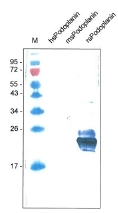Pdpn Mouse Monoclonal Antibody [Clone ID: LF3(B7)D5B3]
Specifications
| Product Data | |
| Clone Name | LF3(B7)D5B3 |
| Applications | IF, IHC, WB |
| Recommended Dilution | Western Blot: 1-5 µg/ml. Immunofluorescence (Acetone Fixed). Immunohistochemistry on Frozen Sections. Immunohistochemistry on Paraffin Sections. |
| Reactivities | Rat |
| Host | Mouse |
| Isotype | IgG1 |
| Clonality | Monoclonal |
| Immunogen | A membrane protein fraction of isolated Rat glomeruli. |
| Specificity | This antibody recognizes Rat Podoplanin. |
| Formulation | PBS, pH 6.0 without preservatives and stabilizers State: Purified State: Lyophilized purified Ig fraction |
| Reconstitution Method | Restore in sterile water to a concentration of 0.1-1.0 mg/ml. |
| Purification | Protein G Chromatography |
| Database Link | |
| Background | Podoplanin, also known as glycoprotein 36 (gp36), PA2.26 antigen, T1-alpha (T1A), and aggrus, is a 36 kDa type I transmembrane sialoglycoprotein and member of the Podoplanin family. Podoplanin has three potential splice variants, the longest of which is represented by a 238 amino acid precursor. It contains an undefined signal sequence, a 22 aa transmembrane segment (aa 207-228) and a short cytoplasmic tail (aa 229-238). The cytoplasmic tail contains putative sites for protein kinase C phosphorylation. There are two potential alternate start sites at Met 77 (Swiss Prot #: Q86YL7) and Met 119 (EAW51692) that generate short forms. The 162 aa short form Podoplanin precursor shares 47% aa identity with mouse Podoplanin. Podoplanin is expressed on glomerular epithelial cells (podocytes), type I lung alveolar cells, lymphatic endothelial cells, and numerous tumors, including colorectal tumors, squamous cell carcinomas, testicular seminoma, and brain tumors. One study shows high expression of Podoplanin mRNA in placenta, lung, skeletal muscle, and heart, and weaker levels in brain, kidney, and liver. Podoplanin is the ligand for C-type lectin-like receptor 2 (CLEC-2). Their association is dependent on sialic acid on O-glycans of Podoplanin. Through its association with CLEC-2, Podoplanin induces platelet aggregation and tumor metastasis. Podoplanin is also necessary for lymphatic vessel formation, normal lung cell proliferation and alveolus formation at birth. |
| Synonyms | Glycoprotein 36, PA2.26 antigen, T1-alpha, Aggrus, PDPN, GP36, PSEC0003, PSEC0025 |
| Note | STAINING PROTOCOL for paraffin-embedded tissue-sections fixed in formalin Anti-rat Podoplanin (#LF3 (B7)D5B3) Ultra Vision LP Large Volume Detection System HRP Polymer (Ready-To-Use) 1. Deparaffinize through xylenes, ethanol, and hydrate to water. 2. Heat-Pre-treatment: in 0,1mol citrate buffer pH 6 in an Autoclave at 1 bar for10 min 3. Cool down at room temperature for 20 min 4. Block in 3% hydrogen Peroxide in PBS 10 min 5. Wash in buffer 6. Apply Ultra V Block and incubate 5 min at room temperature 7. Wash 8. Apply Primary Antibody: LF3 (B7)D5B3 at a dilution 1:1000 in 1%BSA/PBS for 1 hour 9. Wash 4 times 10. Apply Primary Antibody Enhancer and incubate for 10 min at room temperature 11. Wash 4 times 12. Apply HRP Polymer and incubate for 15 min at room temperature in the dark( HRP Polymer is light sensitive) 13. Wash 4 times 14. Incubate with ACE-Chromogen and stain for 5- 10 min 15. Wash 4 times in AD 16. Counter stain with Mayer’s Hämalaun for 1 min 17. Cover slip using an aqueous mounting media |
| Reference Data | |
Documents
| Product Manuals |
| FAQs |
| SDS |
{0} Product Review(s)
0 Product Review(s)
Submit review
Be the first one to submit a review
Product Citations
*Delivery time may vary from web posted schedule. Occasional delays may occur due to unforeseen
complexities in the preparation of your product. International customers may expect an additional 1-2 weeks
in shipping.






























































































































































































































































 Germany
Germany
 Japan
Japan
 United Kingdom
United Kingdom
 China
China






